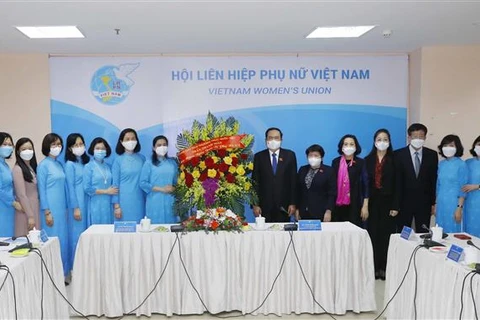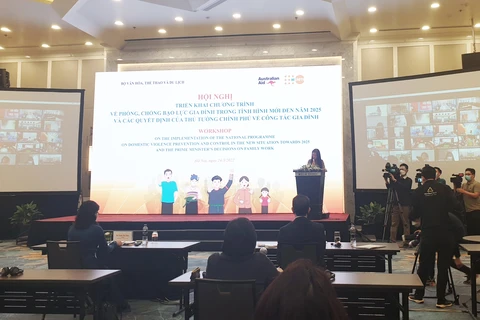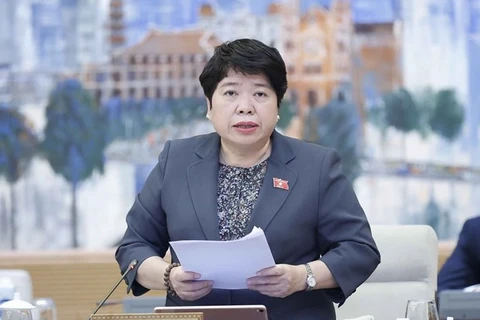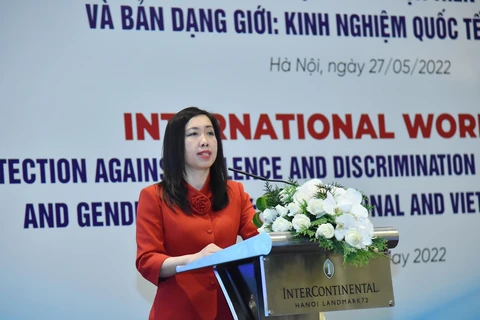Ba Ria - Vung Tau (VNA) – A three-day meeting opened in Vung Tau city, Ba Ria - Vung Tau province, on June 2 to look at the draft amended Law on Domestic Violence Prevention and Control.
Participants, including officials and experts, agreed on the necessity for revisions and supplements to the law. They focused on the principle that regulations must centre on domestic violence victims, acts of domestic violence, regulations on reconciliation, organisations’ roles in disseminating rules on domestic violence, and facts of consultation and reconciliation.
Khuat Van Quy, Deputy Director of the Department of Families under the Ministry of Culture, Sports and Tourism (MCST), said the law’s enforcement over the last 15 years has revealed many problems, so amendments are needed to perfect the legal system.
He noted the law will be amended in a way that protects human rights, the rights of family members, and the rights of domestic violence victims, thereby engaging multiple stakeholders from the political system, society and families in the task to minimise losses and reduce cases.
Naomi Kitahara, Representative of the UN Population Fund (UNFPA) for Vietnam, recommended the revision of this law apply a victim-centred approach which gives the top priority to victims.
“Over the years, UNFPA has been supporting the Ministry of Culture, Sports and Tourism for the revision of the Law to incorporate all recommendations from previous studies and ensure international standards and commitments on the prevention and response to domestic violence,” she added.
Meetings and workshops have been held to discuss draft revisions. The draft amended law, containing six chapters with 62 articles, is being considered by the National Assembly at the ongoing third session in Hanoi, and is expected to be voted on in October this year.
According to data from the MCST, the number of domestic violence cases nationwide stood at 324,641 during 2009 - 2021 and declined year-on-year, from 53,206 in 2009 to nearly 5,000 in 2021.
However, a UNFPA-supported national study on violence against women in 2019 showed little change after 10 years since the first study in 2010./.
Participants, including officials and experts, agreed on the necessity for revisions and supplements to the law. They focused on the principle that regulations must centre on domestic violence victims, acts of domestic violence, regulations on reconciliation, organisations’ roles in disseminating rules on domestic violence, and facts of consultation and reconciliation.
Khuat Van Quy, Deputy Director of the Department of Families under the Ministry of Culture, Sports and Tourism (MCST), said the law’s enforcement over the last 15 years has revealed many problems, so amendments are needed to perfect the legal system.
He noted the law will be amended in a way that protects human rights, the rights of family members, and the rights of domestic violence victims, thereby engaging multiple stakeholders from the political system, society and families in the task to minimise losses and reduce cases.
Naomi Kitahara, Representative of the UN Population Fund (UNFPA) for Vietnam, recommended the revision of this law apply a victim-centred approach which gives the top priority to victims.
“Over the years, UNFPA has been supporting the Ministry of Culture, Sports and Tourism for the revision of the Law to incorporate all recommendations from previous studies and ensure international standards and commitments on the prevention and response to domestic violence,” she added.
Meetings and workshops have been held to discuss draft revisions. The draft amended law, containing six chapters with 62 articles, is being considered by the National Assembly at the ongoing third session in Hanoi, and is expected to be voted on in October this year.
According to data from the MCST, the number of domestic violence cases nationwide stood at 324,641 during 2009 - 2021 and declined year-on-year, from 53,206 in 2009 to nearly 5,000 in 2021.
However, a UNFPA-supported national study on violence against women in 2019 showed little change after 10 years since the first study in 2010./.
VNA

























